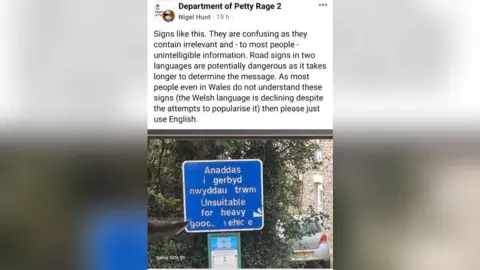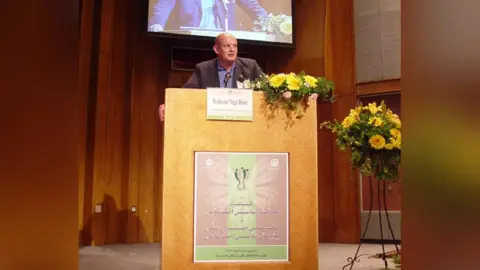Wrexham University professor calls Welsh road signs dangerous
 Wales News Service
Wales News ServiceA university professor has described the use of the Welsh language on road signs as "unintelligible" and "potentially dangerous".
Dr Nigel Hunt, a psychology expert and visiting professor at Wrexham University, lashed out at bilingual Welsh-English road signs.
His comments on a Facebook group prompted complaints to his employers.
The university has apologised for Dr Hunt's comments and said it will investigate.
Dr Hunt said he stood by his comments but apologised for putting them on a Facebook page.
The professor aired his views on a Facebook group called the Department of Petty Rage, where he posted a picture of a bilingual sign and argued it should just be written in English.
Dr Hunt wrote: "Signs like this. They are confusing as they contain irrelevant and - to most people - unintelligible information."
 Wales News Service
Wales News Service"Road signs in two languages are potentially dangerous as it takes longer to determine the message," he said.
"As most people even in Wales do not understand these signs (the Welsh language is declining despite the attempts to popularise it) then please just use English."
In response to Dr Hunt's post on social media platform X, one user said while referring to his employer: "This is an appalling attitude from one of your professors @WrexhamUni.
"Your staff have a duty to treat your Welsh students with respect, calling their language 'irrelevant' is certainly not the way to do this.
"Deeply disappointing."
Another user, Efan ap Ifor, said: "This is hugely disappointing to see @WrexhamUni.
"It highlights that not all educated people, that specialise in one field, are well informed people more generally.
"They aren't immune to lazy xenophobic tropes or possess values or morals that are grounded in inclusiveness."
And Rhys Gethin wrote: "Given the university's recent decision to drop 'Glyndŵr' from its name, having a bigoted professor publicly mock the Welsh language and demand the removal of Welsh signage isn't a good look."
 Wales News Service
Wales News ServiceDr Hunt, said the university had apologised without speaking to him.
"I do not apologise for my comments, which reflect my beliefs," he said.
He said he was "disappointed" by some of the responses to his comments.
"I was called many names, even called a racist, though my post says nothing about people," he said.
"While I accept that the University of Wrexham has a position on the Welsh language, it is critical that members of that university are free to express opinions that go against that position," he added.
"This is academic freedom, and more fundamentally, free speech. We should not be restricting freedom of speech, the right to have opinions that differ from other people."
Wrexham University said it apologised for the offence caused by Dr Hunt's remarks, and said it was in the process of investigating the matter internally.
It said: "We are keen to stress that these comments absolutely do not reflect the views or values of our university or its staff.
"We are proud to be a Welsh institution and are proud of our Welsh history and heritage.
"As an institution, we are also committed to the Welsh Language (Wales) Measure 2011 and as part of the legislation - the Welsh language has equal status with English and must not be treated less favourably."
Road signs in Wales by law have to be written in Welsh first as part of the Welsh Language Act which places the two languages on equal footing and tries to promote Welsh learning.
The Welsh government has set itself a target of one million Welsh speakers by 2050.
